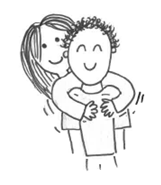Easy Read Sensory

About
We usually think that we have 5 senses; touch, taste, smell, sight and sound.
However, we also have 2 others:
Vestibular - this is about balance
Proprioception - this is to do with body awareness, for example where we are in relation to our surroundings.
These senses give our body information that our brain processes all the time. Processing everyday sensory information can be difficult for autistic people. Any of their senses may be over (feel too much)- or under (don’t feel enough)-sensitive, or both, at different times.
These sensory differences can affect how they feel and act and can affect a person’s life.
Read about sensory differences on the National Autistic Society's website.
Sensory Processing
All our senses give information to our brain. This information helps us to understand our bodies, our feelings and the world around us.
Our brain gets lots of sensory information all the time. Our brain sorts out what we need to know and what we can ignore. This is called sensory processing.
It helps us to do everyday tasks and keep us safe. It also means that we don't get too much information at once.

Find out more about sensory processing, and access online training and videos by visiting https://www.sensoryhelpnow.org/collectionsAll Products - Sensory Help Now
Useful links
Family Fund can help with a grant towards sensory toys and equipment
NHS Tayside Occupational Therapy Service have a great playlist with lots of information split into diffierent videos. You can find out about sensory issues as well as watch training videos.
The Institute of Health Visiting has a resources section.
Cauldwell Children have created sensory packs that cost £20. You can apply for one of their sensory packs if your child has a disability and is between 0 and 18 years old.
Each pack includes a BoBo Massager, Sissle Brush, 4 Ball Massager, Weighted Cushion, Spikey Domes, Space Blanket and a Fibre Optic Lamp.
